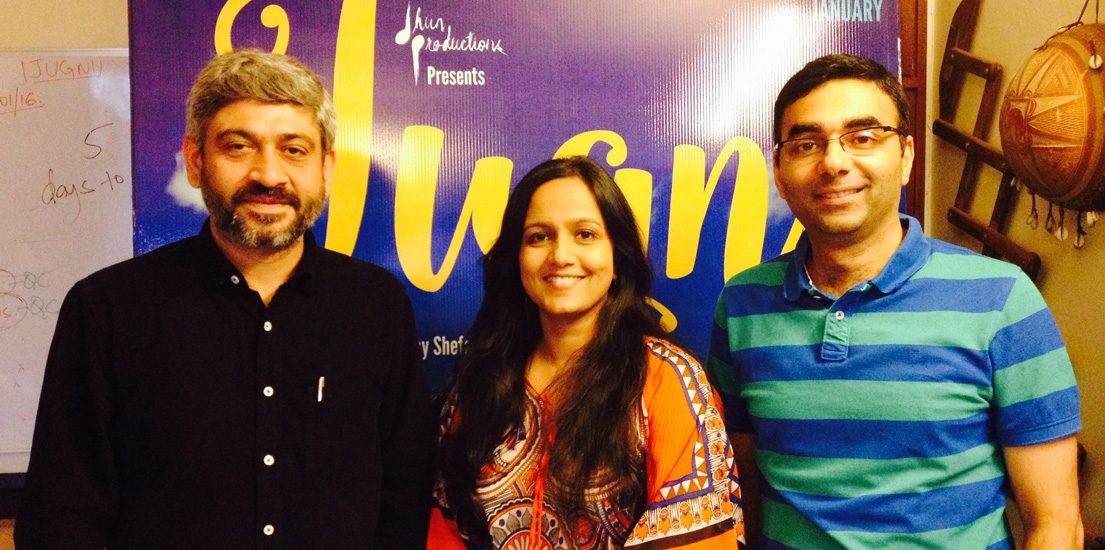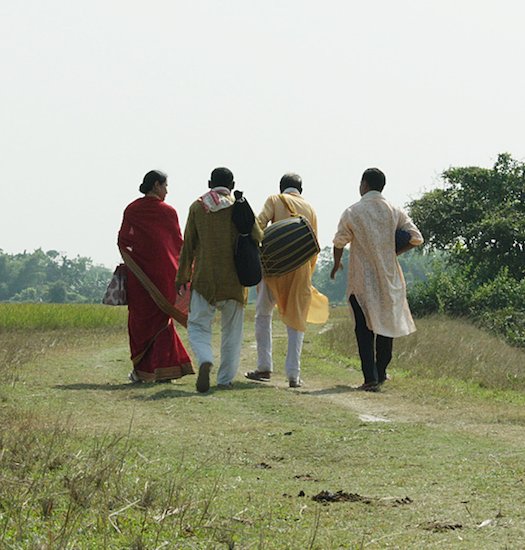Jugni – Exploring moral dilemmas in a relationship
Filmmaking is essentially team work and when everyone in the team is passionately on the same page to achieve a common goal of telling a story, the result is good cinema. This was evident when we met writer – director – producer Shefali Bhushan and producer Manas Malhotra who alongwith producer Karan Grover have made a unique musical called Jugni that releases today.
Jugni is a film about an urban musician, Vibhavari aka Vibs (Sugandha Garg) who travels around India to capture the essence of Indian Folk music. While in Punjab, she meets a rural folk singer, Mastana (Siddhant Behl) whose voice attracts her. The film explores their relationship and what happens thereafter. Shefali and Manas share the experience of making this film.

Karan Grover, Shefali Bhushan and Manas Malhotra
The story of Jugni sounds very interesting. Is the character of Vibhavari inspired by any real life persons like music composer Sneha Khanwalkar ?
Shefali (S): I was actually doing similar activities much before Sneha (Khanwalkar) started her project. I was working on the ‘Beat of India’ project where I personally I travelled from 2000 to 2006 to remote areas in the country in search of real folk music in an attempt to popularize them.
READ: I DON’T PICK THE MOVIES, THEY PICK ME – SUGANDHA GARG
So is it based on any folk singers you met through this project?
S: Not exactly inspired but I drew few inferences from Punjabi folk singer Bibi Swarn Noora and Dilbahar who I met while working on ‘Beat of India’. That’s where I got this story idea to explore the relationship between an urban girl musician and a rural folk singer boy and the moral dilemmas surrounding it.
How did you first decide to get into filmmaking? Any creative background?
S: I completed my Mass Communication from Jamia Millia Islamia and worked on a couple of ads. I then started my documentary project called ‘Beat of India’ to find and popularize talents in folk music. Post that I wanted to give an outlet to my own creative expressions and so I chose to do films. A couple of films didn’t happen due to various external factors. That’s when I learnt and decided that if one wants to make a film, they need to go out and make it. ‘Just do it’ is now my mantra and that’s why I decided to co-produce the movie as well.
Manas (M): I started with Mangal Pandey – The Rising and later worked with a few corporates on the film marketing and production side. I am associated with some unusual projects like the documentary Beyond Bollywood, which followed the journey of four actors in Bollywood for four years. Then we released a German film across India. I was also associated with NFDC’s Film Bazaar. So producing my own film was the next logical step.
READ: INDUSTRIAL SCREENING OFFERS A NON-CURATED PLATFORM FOR FILMMAKERS – MANAS MALHOTRA
How did you cast Sugandha Garg and Siddhant Behl for the lead?
S: Sugandha was recommended to me by Rannvijay. Apart from being a fabulous actress, she is a musician and singer herself and that helped a lot. Moreover, she brought certain nuances to the character, which were not there in my mind. I found my Vibs then and there.
And how did you zero in on Clinton Cerejo as the Music Director?
S: I was following Clinton’s work on Coke Studio. The flavor of his music was something which was close to what I had in mind. I have knowledge of folk music and he is an expert in western music. When I met him, his enthusiasm for the project was enough for us to get him on board for the music.
READ: WORKING ON JUGNI WAS A JOURNEY OF PERSONAL DISCOVERY – CLINTON CEREJO
You’ve managed to rope in the best music talents for the movie. How was the experience of working with stalwarts like Vishal Bhardwaj and A R Rahman?
S: I always knew many people from the field of music due to my work in that field. Karan (Grover, Producer) also had a connect with A. R. Rahman so he brought him in. Clinton was close to Vishal Bhardwaj so that helped in bringing him on board. Their part in our music album is a blessing. They brought so much abundance to the music with their singing.
M: We will always be thankful to them for their gracious contribution.
Being the writer, director and producer of the movie, you are donning multiple hats in this movie. Which one is your favorite and why?
S: I loved writing and directing the film as it is a part of storytelling. And it’s all thanks to my producers Manas and Karan who let me concentrate on the creative process than worrying about production problems.
M: I would like to add that from the very beginning we had decided that each one of us will focus on the tasks that were assigned to. So while Shefali was in control of all the creative decisions, I was focusing on production and Karan was managing finance and money matters. So we were complimenting each other.
Were there any incidence when the director in you overpowered the producer in you?
S: No such incidence took place because I have been through the production experience earlier and I know the importance of working within a budget. I am totally a producer’s director.
M: I second that. She always considered the budget from the first draft itself. There were many scenes in the train which could have increased the budget but we mutually agreed to reduce them at the writing stage itself. So she was very accommodating of the producer’s request.
What according to you was the toughest part in making this film?
M: Raising the finance and releasing the film. Getting screens is a tough challenge as we are releasing the film against some biggies. Mainstream media snubs new producers who actually require support from the media.
What according to you is the future of independent cinema in India?
M: First, we need to define what is ‘Indie’ cinema. In developed countries, there is a clear demarkation that whatever is produced outside the big studio systems is called as ‘Independent’ cinema. In India, we have many independent filmmakers who produce many mainstream films but we won’t call that ‘Indie’. Or do you call it ‘Indie’ cinema if the content is different from mainstream cinema. So then what will you call a film like Dum Laga Ke Haisha?
So I am not sure if we can categorize Jugni as an Indie film or not. For me, cinema should be realistic and entertaining. Having said that, I feel that with the rise of digital platforms to release films and social media platforms to promote them, the growth of Indie films is certain.
With such a vast background in film marketing, is there a unique marketing approach that you’ve tried for this film?
M: I was working with the marketing of unusual content so the scale was smaller than this one. We are releasing Jugni across 200 screens and that is what is different for me. It is essentially a multiplex release.
S: Also, we are reaching out to our contacts in each city to mobilize them to spread awareness about the movie and to get pre-bookings. But that will only help us in getting few shows full. The rest depends on the destiny of the film. It is totally up to the audience now.
Any memorable moments during the shooting of the movie?
S: I cannot forget the first day of the shoot when some actors could not reach and so we had to move another day’s schedule to that day. But the whole team stood by me and they all moved so quickly to not waste a day of the shoot. That incident helped us got close and build a bond that helped throughout the shooting schedule.
M: Punjabi Hospitality. Everyone in the village of Hasanpur helped us so much that we can never forget their graciousness. And I cannot forget the station master who went out of his way to let our shooting in the trains happen comfortably.
What are your upcoming projects?
S: I am working on two scripts. One is a satire while the other is a musical again.
-Prashen Kyawal






